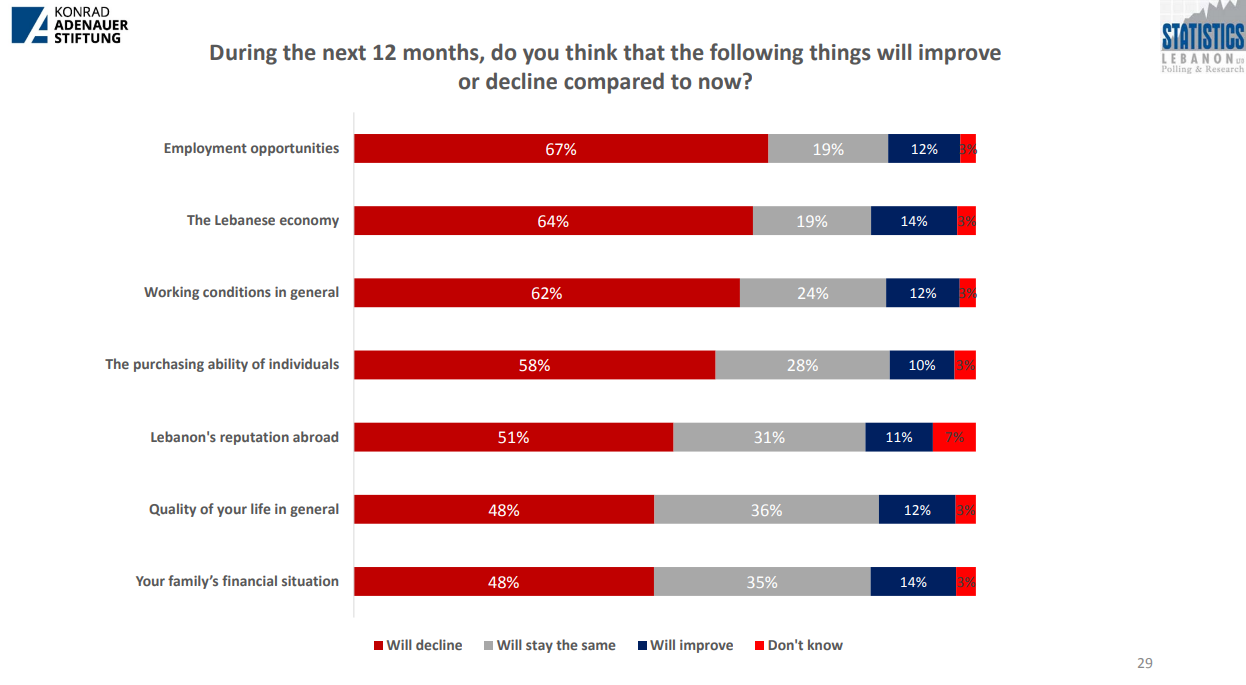The Konrad Adenauer Foundation announced the results of a survey conducted by Statistics Lebanon Ltd, between 04.12.2018 and 13.12.2018 prior to the Lebanese government formation, at the peak of the political crisis following many failed attempts of the formation of a new government.
The survey focused on the Lebanese’ perception of the economic situation of their country and their personal economic well-being, it covered all the Lebanese governorates and socio-economic groups and consisted of 1200 Lebanese males and females equally (50/50) aged above 18 years.
The study focused on four main subjects in Lebanon: The social demographics, the Problems and Concerns of the Lebanese, the Financial Situation, and the Emigration.
The social demographics:
The social demographics results showed that three-quarters (75%) of the sample are employed and the vast majority of them (97%) have just one job, of those 42% are self-employed while 35% are in a paid full-time job.
More than half (52%) of the employees are sales workers. However, housewifes grasped the first place among the unemployed (49%), followed by those looking for a job (23%).
Household income, for the majority of the Lebanese (36%), is ranging from $1,001 to$ 2,000, and they receive their salaries in the Lebanese Lira (88% of them). As for the majority of this sample (64%) is living in 3-4 rooms’ houses and only 10% have domestic workers.
Problems and Concerns of the Lebanese:
The overwhelming majority of the respondents (77%) were pessimistic about the future of Lebanon, believing that things are moving in the wrong direction (95%).
This study highlighted the biggest problems that are facing Lebanon today, which included: Corruption (40%) high cost of living/ high prices (39%) and lack of job opportunities (34%)
The three biggest problems facing respondents’ families were mainly the high cost of living (51%), the lack of job opportunities ( 36%) and the shortage in electricity supply (21%).
68% of the sample assessed the current economic situation in Lebanon as very bad, believing that things are getting worse compared to 12 months ago. Specifically, when it comes to employment opportunities, Lebanese economy, and working conditions in general…
However, this becomes understandable when compared to the economic situation in 2018 with the PMI at 46.2 and economic growth at 1%.
However, a slight optimism was recorded when they were asked about the expected improvement in the upcoming year and this may be due to the enormous hopes of a better political and economic landscape from a formation of a new government.
Respondents had higher levels of trust in the Lebanese Lira in the past 12 months (M=5.53) than they reported to have in the next 12 months (M=4.73).
As for the housing loan crisis, 16% of the respondents reported being personally affected and ( 52%) were pessimistic about finding a solution .
Lebanese Financial Situation
An overwhelming 92% of respondents are not willing to buy or build a house, neither a car (85%) in the next 12 month .The Lebanese included in the survey are neither considering investing in Lebanon (92%) nor outside Lebanon (96%). However, this question should have been addressed to the top income people.
As for the health coverage, more than half (53%) of respondents does not have any, against 47% having a health coverage of which (58%) are covered under the National Social Security Fund and 28% under Insurance companies.
45% of the respondents have a bank account, a higher percentage have a credit card (57%) , 43% having a personal loan .
Nearly half (48%) of the respondents reported having enough means for survival, but not for extra things, also not for savings (87%) which emphasizes our previously mentioned point regarding the investment in Lebanon.
Lebanese and Emigration
In Lebanon, three-in-ten (30%) are considering emigration, specifically permanent one (63%) mainly to improve their financial situation (64%) and to seek employment (25%).
Title: Improvement expectations in the upcoming year

Source: Konrad Adenauer Stiftung